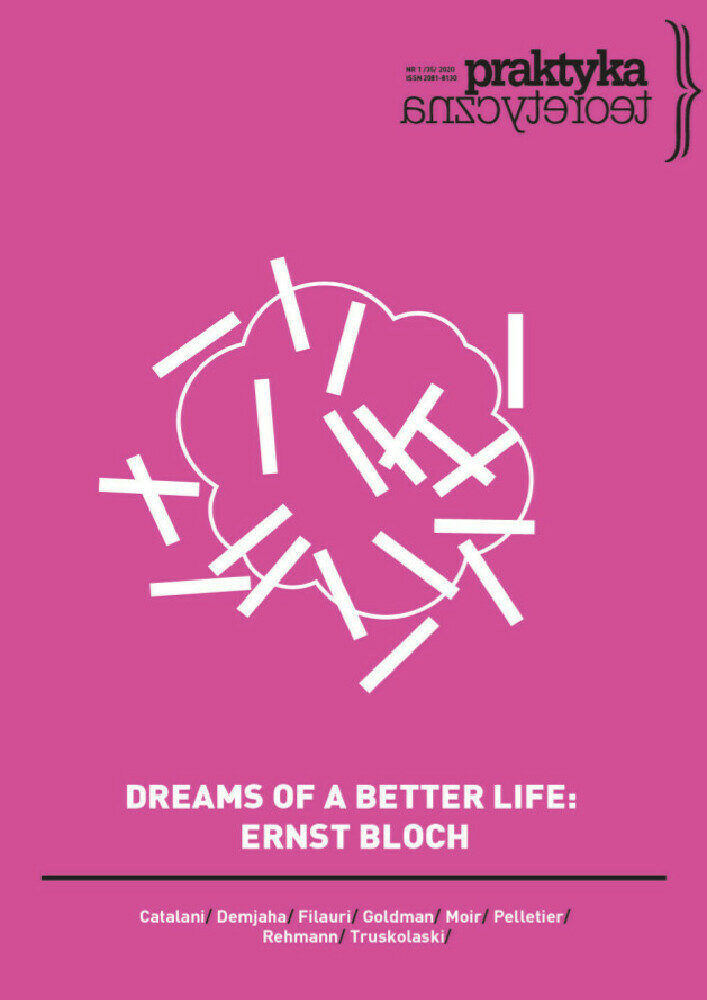Abstract
This paper aims to interpret the role of “objective phantasy” in the utopian tradition of critical theory, with an emphasis on Bloch, but also the evolution of its usage with authors such as Marcuse and Adorno. The main function of phantasy taken into consideration is its capacity to go beyond present facts (what is made possible by an anti-positivist concept of truth in critical theory) and to anticipate. This anticipatory element of phantasy is dependent, as we try to demonstrate, on a reflection of affects around expectation. Ultimately, we oppose two models of anticipatory imagination (while showing their inner relation): a utopian one (primarily conceptualized by Bloch) and its counterpoint, catastrophist anticipation, which assumes its most radical form in Günther Anders’ reflections on the atomic age, and whose actuality and urgency we seek to emphasize.
References
Adorno, Theodor. 1958. Einführung in die Dialektik (1958). Suhrkamp: Frankfurt am Main.
Adorno, Theodor. 1983. Hegel: Three Studies. Translated by Shierry Weber Nicholsen. Cambridge: The MIT Press.
Adorno, Theodor. 2005. Minima Moralia. Translated by Edmund Jephcott. London: Verso.
Adorno, Theodor. 2007. Negative Dialectics. Translated by E. B. Ashton. New York: Continuum.
Adorno, Theodor, and Max Horkheimer. 2002. Dialectics of Enlightenment. Translated by Edmund Jephcott. Stanford: Stanford University Press.
Anders, Günther. 1987. Gewalt – ja oder nein. Eine notwendige Diskussion. München: Knaur.
Anders, Günther. 2003. Die atomare Drohung. München: Beck.
Anders, Günther. 2010. Die Antiquiertheit des Menschen I. München: Beck.
Anders, Günther. 2013. Die Antiquiertheit des Menschen II. München: Beck.
Arantes, Paulo. 2014. O novo tempo do mundo: e outros estudos sobre a Era da Emergência. São Paulo: Boitempo.
Benjamin, Walter. 1972. Gesammelte Schriften Band IV Kleine Prosa. Baudlaire-Übertragungen. Frankfurt am Main: Suhrkamp.
Bloch, Ernst. 1963. Tübinger Einleitung in die Philosophie. Frankfurt am Main: Suhrkamp.
Bloch, Ernst. 1985a. Tendenz-Latenz-Utopie. Frankfurt am Main: Suhrkamp.
Bloch, Ernst. 1985b. Philosophische Aufsätze zur objektiven Phantasie. Frankfurt am Main: Suhrkamp.
Bloch, Ernst. 1996. The Principle of Hope. Translated by Neville Plaice, Stephen Plaice and Paul Knight. Cambridge: The MIT Press.
Habermas, Jürgen. 1985. Die neue Unübersichtlichkeit. Frankfurt am Main: Suhrkamp.
Habermas, Jürgen. 1995. Die Normalität einer Berliner Republik. Frankfurt am Main: Suhrkamp.
Hegel, G. W. F. 2010a. Encyclopedia of the Philosophical Sciences in Basic Outline. Translated by Klaus Brinkmann and Daniel O. Dahlstrom. Cambridge: Cambridge University Press.
Hegel, G. 2010b. Science of Logic. Translated by George di Giovanni. Cambridge: Cambridge University Press.
Hegel, G. 2012. Phenomenology of Spirit. Translated by Terry Pinkard. Cambridge: Cambridge University Press.
Heidegger, Martin. 2011. Seminare Hegel-Schelling. Frankfurt am Main: Vittorio Klostermann.
Horkheimer, Max. 1988. Gesammelte Schriften in neunzehn Bänden. Band 14. Nachgelassene Schriften. Frankfurt am Mein: Fischerverlage.
Jordão Machado, Carlos Eduardo. 2016. Um capitulo da história da modernidade estética: debate sobre o expressionismo. São Paulo: Ed. Unesp.
Kervégan, Jean-François. 2011. Que faire de Carl Schmitt?. Paris: Gallimard.
Krahl, Hans Jürgen. 1971. Konstitution und Klassenkampf. Frankfurt am Main: Verlag Neue Kritik.
Löwy, Michael. 2009. “Ernst Bloch & Theodor Adorno: Luzes do Romantismo”. Cadernos CeMarx, no. 6: 11–28.
Marcuse, Herbert. 1932. Hegels Ontologie und die Grundlegung einer Theorie der Geschichtlichkeit. Frankfurt am Main: Vittorio Klostermann Verlag.
Marcuse, Herbert. 1941. Reason and Revolution. Hegel and the Rise of Social Theory. London: Routledge.
Marcuse, Herbert. 1974. Eros and civilization. A Philosophical Inquiry into Freud. Boston: Beacon Press.
Marcuse, Herbert. 2009. Negations. London: MayFly.
Marx, Karl. 1987. “Contribution to the Critique of Hegel’s Philosophy of Right: Introduction”. Translated by Yuri Sdobnikov. In The Marx-Engels Reader, edited by Robert C. Tucker, 53-65. New York: Norton and Company.
Minkowski, Eugene. 1970. Lived time: Phenomenological and PsychopathologicalStudies. Evanston: Northwestern University Press.
Rehmann, Jan. 2012. “Antizipation”. In Bloch-Wörterbuch, edited by Beat Dietschy, Doris Zeilinger, Rainer Zimmermann, 3–13. Berlin: De Gruyter.
Safatle, Vladimir. 2015. O circuito dos afetos. São Paulo: Cosac Naify.
Scheible, Hartmut. 2012. Kritische Ästhetik: Von Kant bis Adorno. Würzburg: Königshausen & Neumann.
Spinoza, Benedict. 1996. Ethics. Translated by Edwin Curley. London: Penguin.
License
“Theoretical Practice” seeks to put into practice the idea of open access to knowledge and broadening the domain of the commons. It serves the development of science, thinking and critical reflection. The journal is published in open-access mode under the CC-BY-NC-SA 4.0 license (detail available here: http://creativecommons.org/licenses/by-nc-sa/4.0/). Articles published in the journal may be freely distributed, stored, printed and utilized for academic and teaching purposes without restrictions.
They should not be, however, used for any commercial purposes or be reconstructed into derivative creations. Access to the journal may not be limited or offered for a fee by any third party.
Prospective authors are obliged to fill in, sign and send back the publishing contract compliant with the CC licencing. [PL.pdf, PL.doc, EN.pdf,EN.doc].
According to this contract, authors grant the journal a non-exclusive right to publish their work under the creative commons license (CC-BY-NC-SA 4.0) without any financial obligation on both sides of the contract.
Before submission authors should make sure that derivative materials they use are not protected by copyright preventing their non-commercial publication. Authors are responsible for any respective copyright violations.
